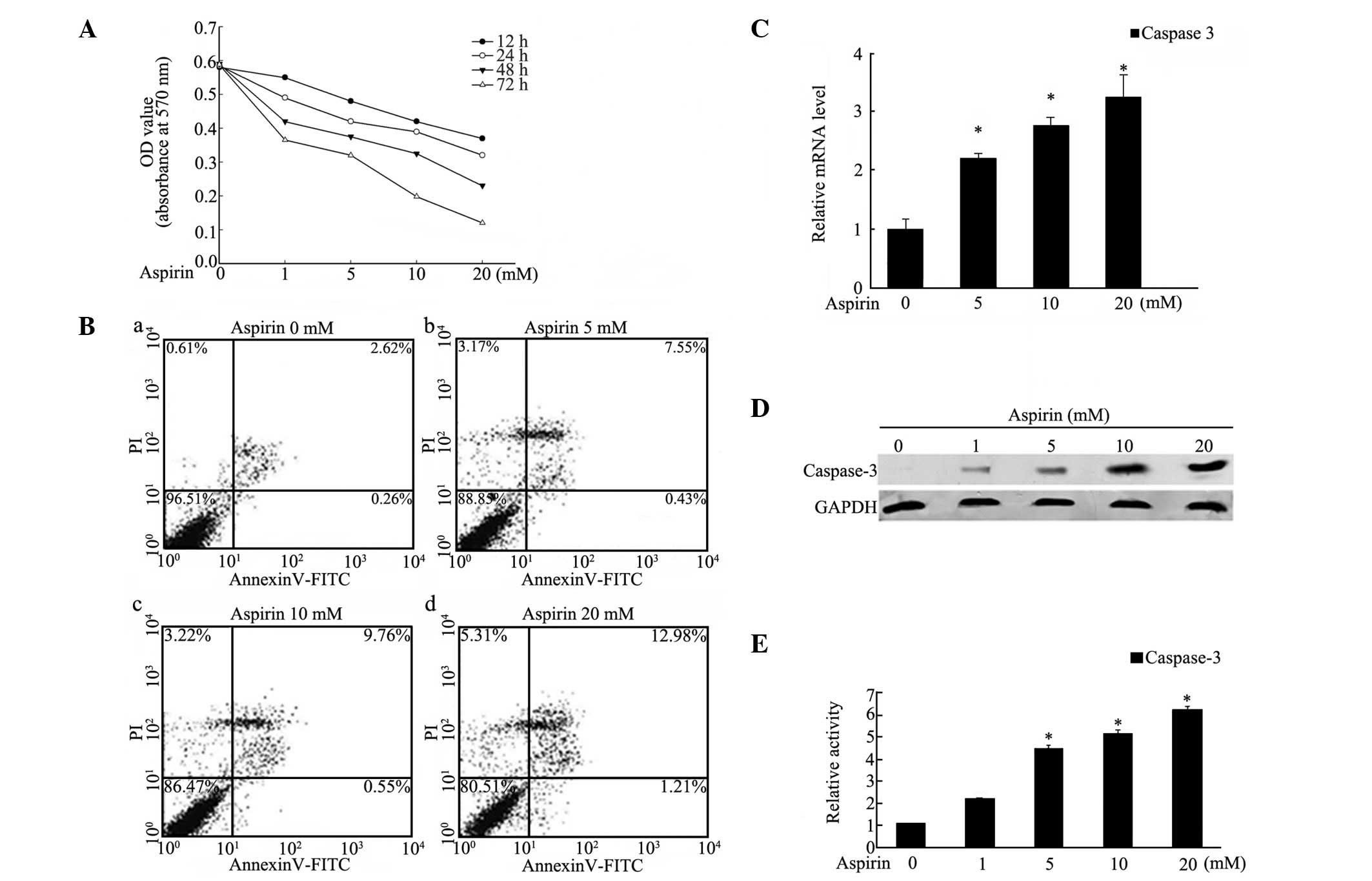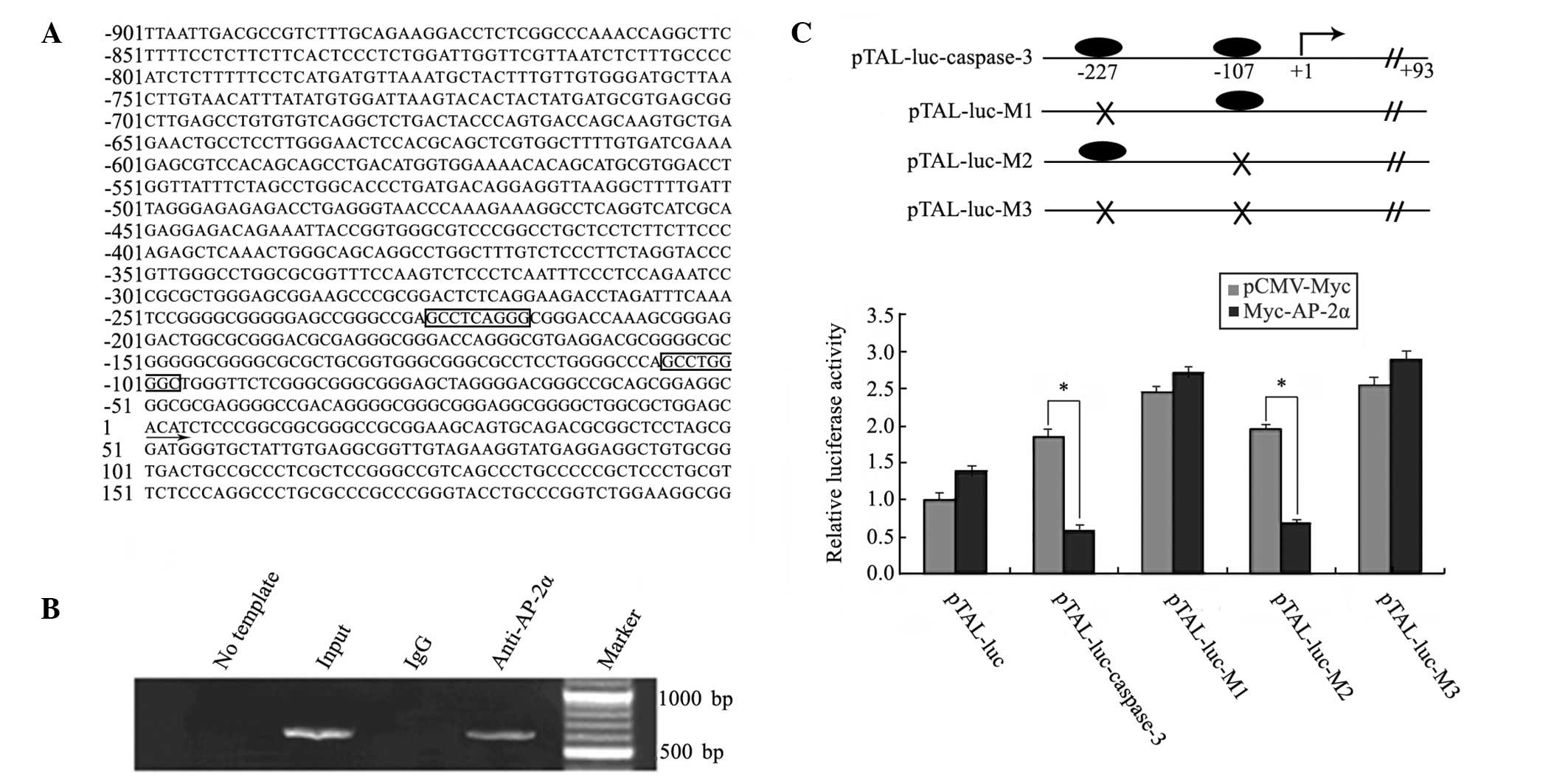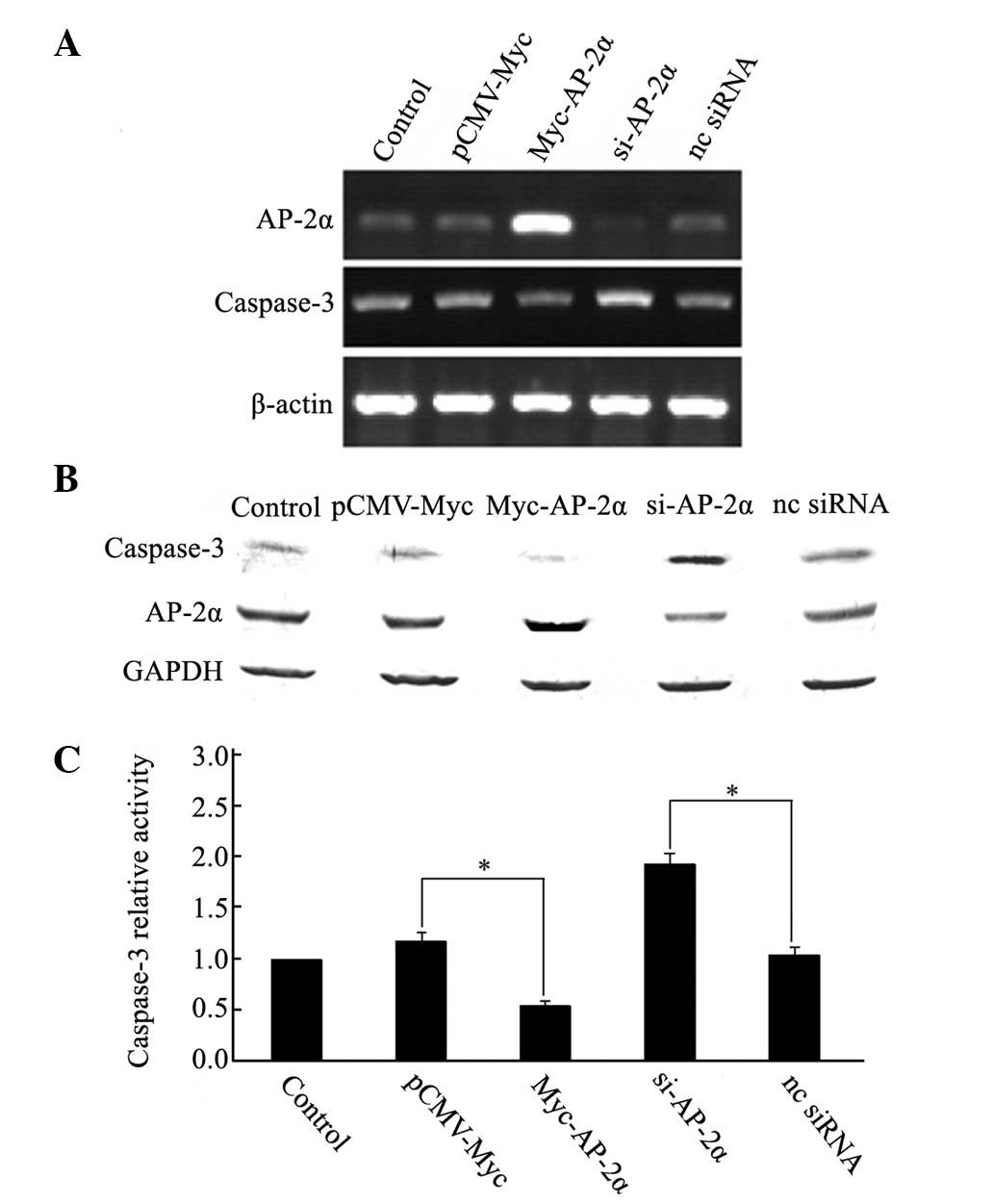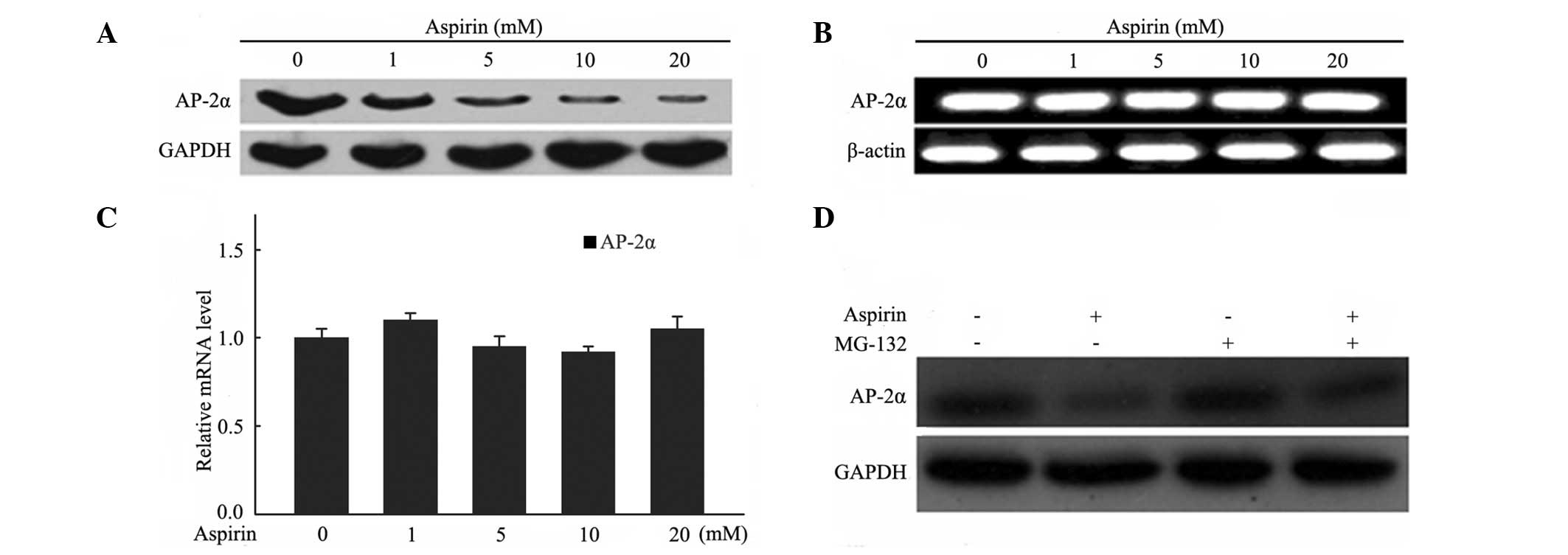|
1
|
Qiao L, Hanif R, Sphicas E, Shiff SJ and
Rigas B: Effect of aspirin on induction of apoptosis in HT-29 human
colon adenocarcinoma cells. Biochem Pharmacol. 55:53–64. 1998.
View Article : Google Scholar : PubMed/NCBI
|
|
2
|
Kutuk O and Basaga H: Aspirin inhibits
TNFalpha- and IL-1-induced NF-kappaB activation and sensitizes HeLa
cells to apoptosis. Cytokine. 25:229–237. 2004. View Article : Google Scholar : PubMed/NCBI
|
|
3
|
Alfonso LF, Srivenugopal KS, Arumugam TV,
Abbruscato TJ, Weidanz JA and Bhat GJ: Aspirin inhibits
camptothecin-induced p21CIP1 levels and potentiates
apoptosis in human breast cancer cells. Int J Oncol. 34:597–608.
2009.PubMed/NCBI
|
|
4
|
Chattopadhyay M, Goswami S, Rodes DB, et
al: NO-releasing NSAIDs suppress NF-κB signaling in vitro and in
vivo through S-nitrosylation. Cancer Lett. 298:204–211.
2010.PubMed/NCBI
|
|
5
|
Zhang Z, Huang L, Zhao W and Rigas B:
Annexin 1 induced by anti-inflammatory drugs binds to NF-kappaB and
inhibits its activation: anticancer effects in vitro and in vivo.
Cancer Res. 70:2379–2388. 2010. View Article : Google Scholar : PubMed/NCBI
|
|
6
|
Zhou H, Huang L, Sun Y and Rigas B: Nitric
oxide-donating aspirin inhibits the growth of pancreatic cancer
cells through redox-dependent signaling. Cancer Lett. 273:292–299.
2009. View Article : Google Scholar : PubMed/NCBI
|
|
7
|
Rigas B and Williams JL: NO-donating
NSAIDs and cancer: an overview with a note on whether NO is
required for their action. Nitric Oxide. 19:199–204. 2008.
View Article : Google Scholar : PubMed/NCBI
|
|
8
|
Harris RE, Beebe-Donk J, Doss H and Burr
Doss D: Aspirin, ibuprofen, and other non-steroidal
anti-inflammatory drugs in cancer prevention: a critical review of
non-selective COX-2 blockade (Review). Oncol Rep. 13:559–583.
2005.
|
|
9
|
Xiang S, Sun Z, He Q, Yan F, Wang Y and
Zhang J: Aspirin inhibits ErbB2 to induce apoptosis in cervical
cancer cells. Med Oncol. 27:379–387. 2010. View Article : Google Scholar : PubMed/NCBI
|
|
10
|
Kim KM, Song JJ, An JY, Kwon YT and Lee
YJ: Pretreatment of acetylsalicylic acid promotes tumor necrosis
factor-related apoptosis-inducing ligand-induced apoptosis by
down-regulating BCL-2 gene expression. J Biol Chem.
280:41047–41056. 2005. View Article : Google Scholar : PubMed/NCBI
|
|
11
|
Luciani MG, Campregher C and Gasche C:
Aspirin blocks proliferation in colon cells by inducing a G1 arrest
and apoptosis through activation of the checkpoint kinase ATM.
Carcinogenesis. 28:2207–2217. 2007. View Article : Google Scholar : PubMed/NCBI
|
|
12
|
Royle JS, Ross JA, Ansell I, Bollina P,
Tulloch DN and Habib FK: Nitric oxide donating nonsteroidal
anti-inflammatory drugs induce apoptosis in human prostate cancer
cell systems and human prostatic stroma via caspase-3. J Urol.
172:338–344. 2004. View Article : Google Scholar : PubMed/NCBI
|
|
13
|
Gu Q, Wang JD, Xia HH, et al: Activation
of the caspase-8/Bid and Bax pathways in aspirin-induced apoptosis
in gastric cancer. Carcinogenesis. 26:541–546. 2005. View Article : Google Scholar : PubMed/NCBI
|
|
14
|
Hilger-Eversheim K, Moser M, Schorle H and
Buettner R: Regulatory roles of AP-2 transcription factors in
vertebrate development, apoptosis and cell-cycle control. Gene.
260:1–12. 2000. View Article : Google Scholar : PubMed/NCBI
|
|
15
|
Turner BC, Zhang J, Gumbs AA, et al:
Expression of AP-2 transcription factors in human breast cancer
correlates with the regulation of multiple growth factor signalling
pathways. Cancer Res. 58:5466–5472. 1998.PubMed/NCBI
|
|
16
|
Bosher JM, Williams T and Hurst HC: The
developmentally regulated transcription factor AP-2 is involved in
c-erbB-2 overexpression in human mammary carcinoma. Proc Natl Acad
Sci USA. 92:744–747. 1995. View Article : Google Scholar : PubMed/NCBI
|
|
17
|
Bosher JM, Totty NF, Hsuan JJ, Williams T
and Hurst HC: A family of AP-2 proteins regulates c-erbB-2
expression in mammary carcinoma. Oncogene. 13:1701–1707.
1996.PubMed/NCBI
|
|
18
|
Agus DB, Akita RW, Fox WD, et al:
Targeting ligand-activated ErbB2 signaling inhibits breast and
prostate tumor growth. Cancer Cell. 2:127–137. 2002. View Article : Google Scholar : PubMed/NCBI
|
|
19
|
Sudhakar C, Jain N and Swarup G: Sp1-like
sequences mediate human caspase-3 promoter activation by p73 and
cisplatin. FEBS J. 275:2200–2213. 2008. View Article : Google Scholar : PubMed/NCBI
|
|
20
|
Hubert MA, Sherritt SL, Bachurski CJ and
Handwerger S: Involvement of transcription factor NR2F2 in human
trophoblast differentiation. PLoS One. 5:e94172010. View Article : Google Scholar : PubMed/NCBI
|
|
21
|
Ji BC, Hsu WH, Yang JS, et al: Gallic acid
induces apoptosis via caspase-3 and mitochondrion-dependent
pathways in vitro and suppresses lung xenograft tumor growth in
vivo. J Agric Food Chem. 57:7596–7604. 2009. View Article : Google Scholar : PubMed/NCBI
|
|
22
|
Ailan H, Xiangwen X, Daolong R, et al:
Identification of target genes of transcription factor activator
protein 2 gamma in breast cancer cells. BMC Cancer. 9:2792009.
View Article : Google Scholar : PubMed/NCBI
|
|
23
|
Power JJ, Dennis MS, Redlak MJ and Miller
TA: Aspirin-induced mucosal cell death in human gastric cells:
evidence supporting an apoptotic mechanism. Dig Dis Sci.
49:1518–1525. 2004. View Article : Google Scholar : PubMed/NCBI
|
|
24
|
Lee SK, Park MS and Nam MJ: Aspirin has
antitumor effects via expression of calpain gene in cervical cancer
cells. J Oncol. 2008:2853742008.PubMed/NCBI
|
|
25
|
Begon DY, Delacroix L, Vernimmen D,
Jackers P and Winkler R: Yin Yang 1 cooperates with activator
protein 2 to stimulate ERBB2 gene expression in mammary cancer
cells. J Biol Chem. 280:24428–24434. 2005. View Article : Google Scholar : PubMed/NCBI
|
|
26
|
Lu M, Strohecker A, Chen F, et al: Aspirin
sensitizes cancer cells to TRAIL-induced apoptosis by reducing
survivin levels. Clin Cancer Res. 14:3168–3176. 2008. View Article : Google Scholar : PubMed/NCBI
|
|
27
|
McCarty MF and Block KI: Preadministration
of high-dose salicylates, suppressors of NF-kappaB activation, may
increase the chemosensitivity of many cancers: an example of
proapoptotic signal modulation therapy. Integr Cancer Ther.
5:252–268. 2006. View Article : Google Scholar : PubMed/NCBI
|
|
28
|
Zhu CH and Domann FE: Dominant negative
interference of transcription factor AP-2 causes inhibition of
ErbB-3 expression and suppresses malignant cell growth. Breast
Cancer Res Treat. 71:47–57. 2002. View Article : Google Scholar : PubMed/NCBI
|
|
29
|
Wajapeyee N and Somasundaram K: Cell cycle
arrest and apoptosis induction by activator protein 2alpha
(AP-2alpha) and the role of p53 and p21WAF1/CIP1 in
AP-2alpha-mediated growth inhibition. J Biol Chem. 278:52093–52101.
2003. View Article : Google Scholar : PubMed/NCBI
|
|
30
|
Müller FU, Loser K, Kleideiter U, et al:
Transcription factor AP-2alpha triggers apoptosis in cardiac
myocytes. Cell Death Differ. 11:485–493. 2004.PubMed/NCBI
|
|
31
|
Wajapeyee N, Britto R, Ravishankar HM and
Somasundaram K: Apoptosis induction by activator protein 2alpha
involves transcriptional repression of Bcl-2. J Biol Chem.
281:16207–16219. 2006. View Article : Google Scholar : PubMed/NCBI
|


















